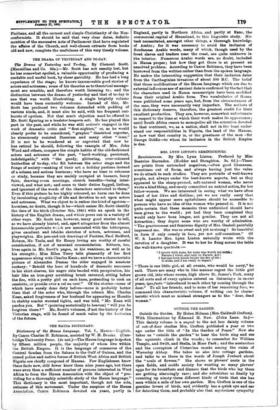THE HAUSA DICTIONARY.
Dictionary of the Hausa Language. Vol. I., Hausa—English. By Canon Charles H. Robinson, assisted by W. H. Brooks. (Cam- bridge University Press. 12s net.)—The Hausa language is spoken by fifteen million people, the majority of whom live within the British Empire. It is the language of commerce of the Central Soudan from the Sahara to the Gulf of Guinea, and the armed police and native forces of British West Africa and British Nigeria are chiefly composed of Hausas. Few Englishmen know these facts now, still fewer knew them nine years ago, but there were even then a sufficient number of persons interested in West Africa to form the Hausa Association with the object of "pro- viding for a thoroughly scientific study of the Hausa language!' This dictionary is the most important, though not the sole, outcome of this movement. Under the auspices of the Hausa Association, Canon Robinson devoted six years, partly in England, partly in Northern Africa, and partly at K11120, the commercial capital of HansaLand to this linguistic study. His task necessitated, amongst other things, a thorough knowledge of Arabic; for it was necessary to avoid the inclusion of Soudanese Arabic words, many of which, though used by the freed slaves and traders near the coast, are quite unknown in the interior. Numerous Arabic words are, no doubt, included in Hausa proper; but how they got there is at present an unsolved problem. According to Canon Robinson, they have been borrowed from the written rather than from the spoken language. He makes the interesting suggestion that their inclusion dates from the Carthaginian invasions of about 500 B.C. The belief that those modifications of the Hausa language which are due to external influences are of ancient date is confirmed by the fact that the characters used in Hausa manuscripts have been modified from their original Arabic form. Two vocabularies of Hausa were published some years ago, but, from the circumstances of the case, they were necessarily very imperfect. The authors of this dictionary deserve, therefore, the greatest credit for their excellent production. They are, however, somewhat unfortunate in respect to the time at which their work makes its appearance ; until South Africa ceases to monopolise all the attention devoted to that continent, we, as a nation, shall not in the least under- stand our responsibilities in Nigeria, the land of the Hausas, or how vast that country is, or the greatness of the man –Sir George Goldie—to whom its inclusion in the British Empire is due.


















































 Previous page
Previous page